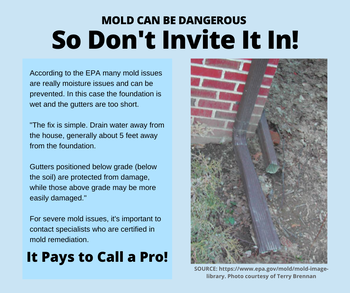
When the United States Environmental Protection Agency, or EPA, speaks… most of us listen.
And the EPA has much to say about mold, which can affect health in minor, irritating ways (slight respiratory issues) to severe life-threatening reactions, resulting in medical care and the unthinkable.
Here are the edited highlights from the EPA.gov site, along with our own thoughts, that all households should consider. Of course, the EPA recommends that everyone should fix plumbing leaks, water intrusion issues, and keep all interior surfaces clean and dry at all times. If you do this, mold should not be an issue. But if it happens, here are some tips.
Mold cleanup
Who should do the cleanup? There are a number of factors. First, consider the size of the mold problem. If less than 10 square feet, you may be able to handle the cleanup yourself. However, with water damage and mold growth more than 10 feet, consult an expert. And there is no way to know 100% if even a small amount of mold could have an adverse health effect on you or those you care about.
HVAC and air conveyance systems
Don’t minimize the impact that mold can have in your ductwork or other air conveyance areas. Hidden mold may be out of sight, but it should be taken seriously. Slight musty odors should trigger an investigation. Get your duct work inspected immediately and have the work done by a professional.
Restrooms, shower stalls and more
Mold is normal in some areas, like in the corner of a shower stall. Don’t panic. Just clean it up. But if you need help, hire a pro. A very small amount of mold is no doubt fresh and can be easily removed.
Hiring a pro
If you decide to contact and use a disaster restoration company or a mold removal service, be a smart consumer and check their references and credentials. There are many “companies” that claim to be experts in mold removal, but they are far from qualified.
Do the right thing with mold. When you know you have it, you should know how to get rid of it. The easiest, best, and safest way is to let a disaster restoration, water damage, or mold remediation company do the work. After all, it pays to call a pro!


